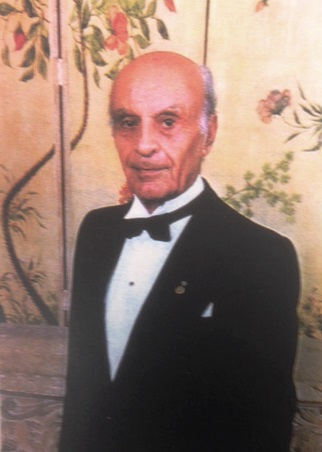
Ruhollah Kohanim was born in 1912 into a devoted Jewish family in Oudlajan, Tehran, Iran. His father was Haj Mirza Kohanim, who was a successful merchant and the founder of the Kohanim Company.
Ruhollah Kohanim went to Alliance Elementary School and then to Tejarat (i.e. business) High School, where he studied Economics. He began his national military service when he graduated from high school. Upon graduating from military school as an officer, Kohanim Company immediately employed Ruhollah as their financial supervisor and advisor. He simultaneously continued his education and graduated Cost Accounting and Industrial Management programs, and acquired a doctorate degree in Economics. Since he was experienced at trade and the laws governing business and taxes, he worked for several companies as their accountant and tax manager. In recognition of the service he had offered to Kohanim Company, he was promoted as a shareholder of the company.
After completing his service in the army, Ruhollah Kohanim married Talat from the Kohn family. They had two sons, Farhad and Farzad, and a daughter named Hannane, all of whom completed their higher educations.
Ruhollah Kohanim was one of the few members of the Jewish community and also the Tehran bazaar in that period who was an academician and an educated businessman at the same time, for which businessmen and Jewish cultural centers quickly noticed him. In 1946, Dr. Enayatollah Montakhab, who was the chairman of the Kurosh Cultural Society, encouraged him to collaborate in cultural activities. Ruhollah immediately participated in community activities, and soon became a member of the Tehran Jewish Committee.
At first, he became the director of the society. He had the duty to supervise Dr. Musa Beral’s campaign to become a member of the National Consultative Assembly as the representative of the Jewish minority in Iran, which was the national parliament of that time. Soon, he was appointed as the Secretary-General of the Tehran Jewish Committee, where his decision was to systematize the bureaucratic procedures between this organization and others. Afterward, he created a network with all other Jewish cultural and religious societies and institutions in Tehran and other cities, putting them all under the support of the Tehran Jewish Committee.
His authority was extended to make him the financial supervisor of the Tehran Jewish Committee, due to his achievements in his previous positions.
Ruhollah Kohanim accepted sensitive responsibilities during the half-a-century that he served in the Tehran Jewish Committee. He founded the Tehran Jewish Chamber of Commerce, chaired by Habib Elghanian. He was also the financial supervisor of the Kurosh Institute. Ruhollah Kohanim was a member of the [community] charity, representative of the Jewish minority to the Iranian parliament for several terms, director of the supervisory board of Parliament elections (the representatives were Jamshid Kashfi, Dr. Beral, and Lotfollah Hai), and also supervisor of the chairman of the Committee, which was Haj Habib Elghanian. Ruhollah Kohanim was an active member of the cultural committee, the arbitration committee, the representative of the Tehran Jewish Committee Fund, a member of Tehran Bet Din, administrator of the real estate office of the Tehran Jewish Committee, the financial supervisor of the Kheyrkhah Foundation hospital—Dr. Sapir hospital—, and the secretary-general of the cultural and sanitation committees.
In the private sector, Ruhollah Kohnim advised many companies, such as “General Steel” and “Plasco”. He was an active member of the Supervisory Board of the Second Iranian Constituent Assembly elections, a member of the Chamber of Commerce, in addition to many other Jewish and non-Jewish cultural and social organizations.
However, in 1979, Ruhollah Kohanim was forced to immigrate to the United States along with his family reluctantly. They settled in Los Angeles, but once he had organized his life in the foreign country, he restarted his community activity. Ruhollah Kohanim joined several religious and cultural Jewish committees and organizations in Los Angeles, which had asked for his participation. He became the secretary-general and elections supervisor of the Nessah Cultural Organization, a supervisory member of the Bani Bart, a member of the Board of Trustees of the Iranian Jews Federation, the Retirement Center, Rancho Park Chamber of Commerce, and the Iranian Jewish Social Welfare Organization, where he was a significant member.
During retirement, Ruhollah Kohanim committed to one of his oldest dreams—writing a book that collects a century of the cultural, social, and educational contributions of the Iranian Jewish community. The book consists of a series of interviews with Iranian Jews and their memories. A section of the book is titled “Oral History”, which includes a history of the Jewish cultural, academic, and religious centers. This section also provides biographies of Jewish intellectuals, teachers, and those who contributed significantly to the Jewish culture, history, and society.
It took six years of restless work to complete and publish the section on the history and documents. The book was titled “Treasury of Gold (1001 anecdotes)” and published in Los Angeles in 1993, with the help of the Society of the Iranian Jews of America and the Ruhollah Kohanim Foundation. He continued his research, and two other sections of the book were published in 1995 and 1997. The rest of the contents of the book were published in the next volumes of the book, a total of six volumes, which was printed with his funding.
The book immediately became popular among community members, and a reprint was soon needed. The book was distributed and delivered to Iranian Jews around the world. Many Jewish researchers believe that this book is an excellent contribution to the preservation and dissemination of the historical documents of the Jewish community.
Ruhollah Kohanim has exclaimed that he owes all his achievements and success in serving the Jewish community to his wife, Talat Kohn, who always encouraged and supported him.
Dr. Ruhollah Kohanim was a committed intellectual of the Jewish community who culturally and socially served his community for more than 75 years. In September 2011, Dr. Ruhollah Kohanim passed away aged 99, in a land far from home.


 فارسی
فارسی